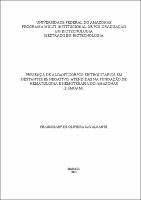| ???jsp.display-item.social.title??? |


|
Please use this identifier to cite or link to this item:
https://tede.ufam.edu.br/handle/tede/2236Full metadata record
| DC Field | Value | Language |
|---|---|---|
| dc.creator | Cavalcante, Francimary de Oliveira | - |
| dc.creator.Lattes | http://lattes.cnpq.br/5745031281813653 | por |
| dc.contributor.advisor1 | Santos, Maria Cristina dos | - |
| dc.date.available | 2015-04-08 | - |
| dc.date.issued | 2005-10-26 | - |
| dc.identifier.citation | CAVALCANTE, Francimary de Oliveira. Presença de Aloanticorpos Eritrocitários em gestantes Rh negativo, atendidas na Fundação de Hematologia e Hemoterapia do Amazonas (Hemoam).. 2005. 102 f. Dissertação (Mestrado em Biotecnologia) - Universidade Federal do Amazonas, Manaus, 2005. | por |
| dc.identifier.uri | http://tede.ufam.edu.br/handle/tede/2236 | - |
| dc.description.resumo | A presença de aloanticorpos irregulares eritrocitários da classe G, na circulação materna, pode causar serias conseqüências ao neonato. A aloimunizacao pode ocorrer em diversas situações, consideradas de risco, como partos com incompatibilidade sanguínea, aborto, amniocentese, transfusões sanguínea, dentre outras. Neste estudo foi verificada a presença de aloanticorpos circulantes regulares e irregulares, em mulheres atendidas no Programa de Gestantes Rh Negativo (PGRhN) da Fundação de Hematologia e Hemoterapia do Amazonas (HEMOAM). Foi realizado um estudo retrospectivo e para o qual, foram levantados os registros de gestantes atendidas durante o ano de 2003, como também, os dados de seus recém-nascidos. Outro estudo, prospectivo, foi realizado e foram analisadas amostras de sangue de gestantes, atendidas no PGRhN entre os meses de abril a novembro de 2004, como também de seus recém-nascidos. Todos os testes utilizados foram preconizados pelo Manual Técnico da American Association of Blood Bank (2005). A freqüência de aloimunizacao no estudo Retrospectivo (5,6%) não apresentou diferença significante com a do estudo Prospectivo (3,5%). A freqüência de anticorpos fixados as hemácias, nos recém-nascidos de mães aloimunizadas, foi bastante alta, de 67% no estudo prospectivo e de 72,7% no estudo retrospectivo. A freqüência de aloanticorpos regulares da classe G foi de 87% nas gestantes do estudo prospectivo e a incompatibilidade ABO materno-fetal foi de 17% para as mães O, com filhos A ou B. O índice de aloimunização irregular no PGRhN ainda e muito alto, quando comparado aos trabalhos de outros autores, mostrando que devem estar ocorrendo falhas na prevenção e possíveis erros na administração da soroterapia, em situações de risco. Ressalte-se ainda, a alta freqüência de aloanticorpos regulares da classe G, que podem induzir a Doença Hemolítica do recém-nascido (DHRN) por incompatibilidade ABO. | por |
| dc.description.abstract | The presence of G class irregular erythrocyte alloantibodies in the blood circulation during pregnancy may cause a series of consequences to the newborn. The alloimmunization can occur under different situations, such as: blood incompatibility during delivery, miscarriage, amniocentese, blood transfusion, among others, all considered being risky. This study investigated the occurrence of regular and irregular circulating alloantibodies in women under the care of the Program of RhD-negative Expecting Mothers (PGRhN) of the Amazonas Hematology and Hemotherapy Foundation (HEMOAM). A retrospective study was carried out compiling the data of all expecting mothers under care during 2003, as well as the information regarding their newborns. A second study, prospective, was done by analyzing the blood samples of expecting mothers under the care of the PGRhN between April and November 2004, as well as the information on their respective babies. All tests were carried out following the methodology presented in the American Association of Blood Bank Technical Manual (2005). The comparison of the alloimmunization frequency between the first (5.6%) and the second (3.5%) studies showed no significant difference. The frequency of antibodies attached to the erythrocytes in the newborns of alloimmunized mothers were high, 67% in the retrospective study and 72.7% in the prospective study. The frequency of G class regular alloantibodies was 87% in the prospective study and the ABO maternal-fetal incompatibility was 17% in O type mothers with A or B type progeny. The occurrence of irregular alloimmunization in the PGRhN is still high, comparing with the numbers of other authors, indicating that the Program may be failing in preventing the problem to occur or errors may have been made during the sorotherapy of patients under risk. Also, it was observed a high frequency of G class regular alloantibodies which can cause the Hemolytic Disease of the Newborn (HDN) due to ABO incompatibility. | eng |
| dc.description.sponsorship | Conselho Nacional de Desenvolvimento Científico e Tecnológico | - |
| dc.format | application/pdf | por |
| dc.thumbnail.url | http://200.129.163.131:8080//retrieve/6974/Dissertacao%20Francimary.pdf.jpg | * |
| dc.language | por | por |
| dc.publisher | Universidade Federal do Amazonas | por |
| dc.publisher.department | Instituto de Ciências Biológicas | por |
| dc.publisher.country | BR | por |
| dc.publisher.initials | UFAM | por |
| dc.publisher.program | Programa de Pós-Graduação em Biotecnologia | por |
| dc.rights | Acesso Aberto | por |
| dc.subject | Aloimunizacao | por |
| dc.subject | Aloanticorpos, gestante, Rh negativo | por |
| dc.subject | Doença hemolítica do recém-nascido | por |
| dc.subject | Alloimmunization | eng |
| dc.subject | Alloantibodies | eng |
| dc.subject | Pregnant | eng |
| dc.subject | RhD-negative | eng |
| dc.subject | Hemolytic Disease of the Newborn (HDN). | eng |
| dc.subject.cnpq | CIÊNCIAS BIOLÓGICAS | por |
| dc.title | Presença de Aloanticorpos Eritrocitários em gestantes Rh negativo, atendidas na Fundação de Hematologia e Hemoterapia do Amazonas (Hemoam). | por |
| dc.type | Dissertação | por |
| Appears in Collections: | Mestrado em Biotecnologia | |
Files in This Item:
| File | Description | Size | Format | |
|---|---|---|---|---|
| Dissertacao Francimary.pdf | 625.22 kB | Adobe PDF |  Download/Open Preview |
Items in DSpace are protected by copyright, with all rights reserved, unless otherwise indicated.




